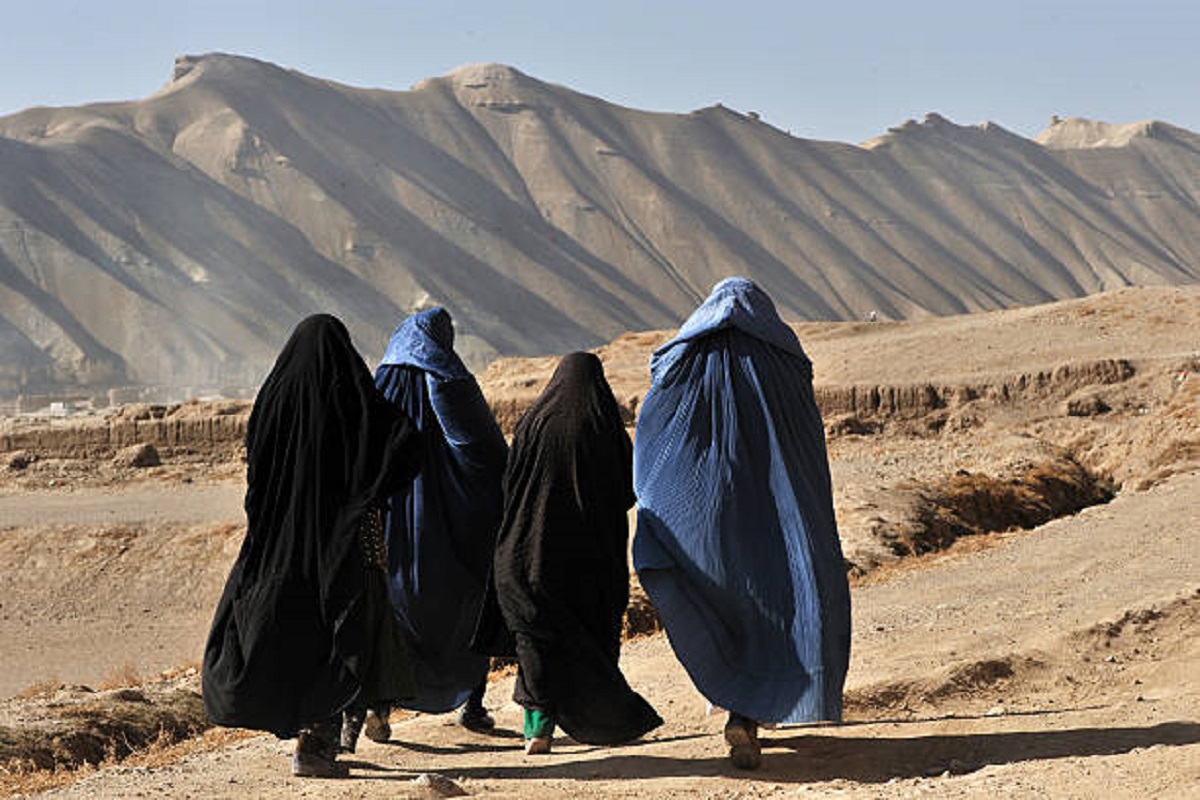Muslim women are not worried,” according to a spokesperson of Afghanistan’s Ministry of Virtue and Prevention of Vice. This characterisation of Muslim women’s feelings stems from the new rules issued by the Taliban regime on Saturday mandating a face covering for all Afghan women. Afghan women must now wear the burqa that covers them entirely, with only their eyes exposed, or they can wear an abaya, along with a hijab, and a face veil.
Warnings will be issued to the male guardians of those who do not comply, after which they could face jail time if their women relations still refuse to submit to the Taliban’s diktat. Women government employees not wearing the face-covering would be sacked, while male employees with women family members who defied the injunction would be suspended from their jobs, if they actually have one.
Advertisement
It is predictable if dystopian situation. Half of the Afghans are estimated to be facing starvation as their aid-fed economy has collapsed. When the Americans left last August, about 40 per cent of the economy was propped up by foreign aid. In the aftermath of the American exit, very few aid organisations, if any, remain. This means that an end to food shortages is unlikely. The Taliban, perhaps petulant because of the lack of recognition they have received from the international community, may have calculated that it is better to do what they want and be who they are. Forcing women to veil themselves, it now appears, is a reflection of their authentic selves: obscurantist, intolerant and cruel.
Most Afghan women are not sur- prised. While the Taliban may present the veil as a necessary requirement for all Muslim women, the actual reasons for its forced imposition seem to be political and strategic. Over the past several months, the Taliban as a governing force has shown a complete inability to feed their people. The fact that the veil was not immediately imposed was a half-hearted decision as they made an effort to woo the international community and present a face that was not committed to the complete elimination of Afghan women from public spaces.
That branding effort of ‘Taliban- lite’ fell flat on its face. In the world in which we live today, even humanitarian disaster is a competitive sport. Afghanistan may have been the ghastliest humanitarian crisis until this February when the Russian invasion of Ukraine set the stage for a new one. Since then, the attention of humanitarian organisations and transnational lending institutions has been diverted to a conflict where those suffering are white and Western.
The part no one says out loud is that it is easier for humanitarian organisations, whose boards are almost completely comprised of white Westerners, to have sympathy for them. So, the aid is pouring into Ukraine, with Afghanistan and it’s now burqa-clad women wiped off the conscience of the world.
It is easier to figure out the good guys versus the bad guys in the Ukraine conflict, which lends itself to the saviour narrative that accompanies the provision of aid to suffering countries. It is also worth noting that Afghanistan is facing tougher sanctions today than Vladimir Putin’s Russia which has only seen a portion (and not all) of its currency reserves frozen.
The Taliban government has failed to make a case for their own country and the dire and tragic consequences are likely to include mass starvation. Instead of making Afghanistan hospitable to humanitarian efforts, they have appeared disinterested and outright hostile to any foreign presence. The latest edict on the veil could be a last-ditch effort to create a controversy and get some international attention, perhaps even set terms for the rule to be rescinded if the international community provides emergency aid and the US releases Afghanistan’s currency reserves. It is far more likely though that the Taliban, unable to showcase their power as a governing force in other ways, are doing so by forcing half the country’s population into invisibility. Forced veiling creates a sudden and dramatic transformation of the public sphere, just the sort of reiteration of their power that the Taliban seem to crave.
American feminists are not tuned in to the plight of Afghan women. Long gone are the histrionics over the burqa and the promises to liberate Afghan women. Instead, there is resignation, an attitude that suggests that most women like Hillary Clinton and feminist Gloria Steinem have accepted the fact that Afghan women must endure the brutality of the Taliban and quietly put on their face veils.
Last week’s events in the US have further buried the issue of forced veiling in Afghanistan. Late last week, America’s Taliban-equivalent conservatives scored a huge victory. A leaked Supreme Court opinion procured by a news agency revealed that the court has decided to overturn a landmark case (Roe vs Wade) that gave women the right to terminate their pregnancies. In some American states like Texas, this means that pregnant women cannot terminate their pregnancies even if they were at risk of losing their lives. Nor are there exceptions for rape, incest, or serious genetic abnormalities. Other Republican-controlled states are getting ready to pass ‘feticide’ statutes, in which women can be convicted of murder if the baby they are carrying is stillborn.
It is a bleak moment for Afghan women. The veil itself is not the biggest issue facing Afghan women, but the Taliban’s obsession with it means that they are uninterested in focusing on larger issues such as maternal health, immunisations, lack of education and malnutrition. The absurdity of it all is highlighted by the truth that Afghan babies are dying in huge numbers and all that the Taliban government has to say to their mothers is ‘wear a burqa’.











